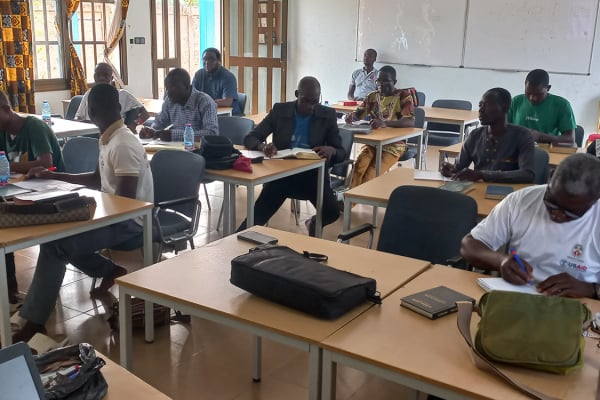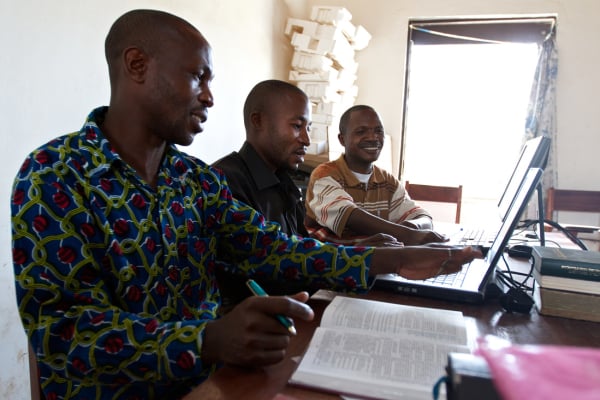
September 9, 2015
Equipping God’s People for the Workplace (Part 4)
Read the series: Part 1 | Part 2 | Part 3 | Part 4 | Part 5
In her forward to Tim Keller’s book, Every Good Endeavor, Katherine Leary Alsdorf writes:
Consider the potential impact if these biblical themes were regularly woven into the fabric of the church’s discipleship.
Vocation | God assigns and calls us to our various jobs and situations, where we are to walk as believers and make disciples (1 Corinthians 7:17).
The design and dignity of work | Work is built into humanity’s DNA as a reflection of the God who worked to create us in His image. From the manual laborer (like God who worked the dust to create us, and later became a carpenter) to the artist (like God who created the infinite beauty of the universe and all that is in it), all honest work has dignity because we are doing what we were made to do as image-bearers of a working God.
The cultural mandate to fill and subdue the earth | More than just a command to procreate, humanity is to reflect the image of God throughout the earth by stewarding the creation as His vice-regents, ruling over all. This is where the global purpose of God begins — His glory is to be displayed among all nations through His people. The Great Commission starts here!
Working for the common good | What does it look like when work is not just for our individual satisfaction — a paycheck and personal fulfillment — but contributes to the greater well-being of God’s world that He wants to bless?
Sabbath rest | Following God’s example (and command), we respect the biblical rhythm of one day out of seven for rest and refreshment, from which we draw strength by resting in God.
These are a few basic themes of a theology of work that should inform God’s people as they bring the gospel into every aspect of life. And all of these realities need to be seen against the backdrop of a fallen world where idolatry of various sorts has replaced the worship of the true God. Going further, what does the integration of a gospel worldview look like in the many different cultures of work: business, healthcare, education, arts, media, engineering, etc.?
What would happen in our churches and in the multitude of workplaces represented by God’s people if the integration of faith and work was a regular part of the church’s nutritional diet?
In her forward to Tim Keller’s book, Every Good Endeavor, Katherine Leary Alsdorf writes:
Living out my faith in my work seemed relegated to small symbolic gestures, to self-righteous abstinence from certain behaviors, and to political alignments on the top cultural and legal issues of the day.... The churches I found didn’t seem to offer much guidance on how I should do this. Most pastors were more concerned about helping us serve inside the church than about discipling and equipping us to serve in the world.I find myself agreeing with Alsdorf, who is the Founder and Executive Director of Redeemer Church’s Center for Faith and Work. A theology of work, centered on the gospel, that intentionally connects Sunday morning content and Monday morning work often seems lacking in our churches. But that theology is absolutely necessary if God’s people are to have the impact at work that we all desire but rarely see.
Consider the potential impact if these biblical themes were regularly woven into the fabric of the church’s discipleship.
Vocation | God assigns and calls us to our various jobs and situations, where we are to walk as believers and make disciples (1 Corinthians 7:17).
The design and dignity of work | Work is built into humanity’s DNA as a reflection of the God who worked to create us in His image. From the manual laborer (like God who worked the dust to create us, and later became a carpenter) to the artist (like God who created the infinite beauty of the universe and all that is in it), all honest work has dignity because we are doing what we were made to do as image-bearers of a working God.
The cultural mandate to fill and subdue the earth | More than just a command to procreate, humanity is to reflect the image of God throughout the earth by stewarding the creation as His vice-regents, ruling over all. This is where the global purpose of God begins — His glory is to be displayed among all nations through His people. The Great Commission starts here!
Working for the common good | What does it look like when work is not just for our individual satisfaction — a paycheck and personal fulfillment — but contributes to the greater well-being of God’s world that He wants to bless?
Sabbath rest | Following God’s example (and command), we respect the biblical rhythm of one day out of seven for rest and refreshment, from which we draw strength by resting in God.
These are a few basic themes of a theology of work that should inform God’s people as they bring the gospel into every aspect of life. And all of these realities need to be seen against the backdrop of a fallen world where idolatry of various sorts has replaced the worship of the true God. Going further, what does the integration of a gospel worldview look like in the many different cultures of work: business, healthcare, education, arts, media, engineering, etc.?
What would happen in our churches and in the multitude of workplaces represented by God’s people if the integration of faith and work was a regular part of the church’s nutritional diet?
More Articles
TOGO — A man prayed for 38 years for the church to come to his village.
August 6, 2025
CANADA — A routine maintenance visit leads to a search for eternal truth.
September 3, 2025
CENTRAL ASIA — A chemistry class assignment sparks questions of faith for Maya in Asia.
October 1, 2025
FRANCE — Lucie’s isolated faith turns to bold witness in her new community.
November 5, 2025
MEXICO — Andrew’s encounter at the doorstep served an entirely different purpose.
February 4, 2026
BRAZIL — A paraplegic woman comes to faith through a gospel necklace and helps others do the same.
January 7, 2026
WEST ASIA — A Christmas gift melted Liliya’s desire for revenge.
December 3, 2025
.png)

 By John Spadafora
By John Spadafora











